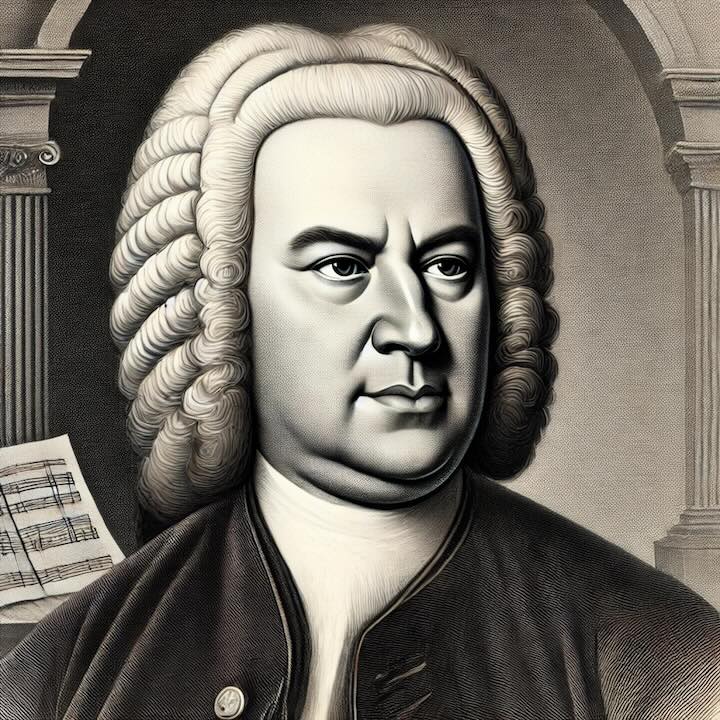Johann Sebastian Bach (1685-1750)

One of history's outstanding musical geniuses, this German composer created a wealth of musical literature. The development of polyphony stands as his most important achievement. Among his works: The Well-Tempered Clavier, St. Matthew Passion, Mass in B Minor, the Brandenburg Concertos, and the Goldberg Variations..
Johann Sebastian Bach, born on March 31, 1685, in Eisenach, Germany, is one of the most revered composers in the history of Western music. His works, which include some of the most profound and complex compositions ever written, have influenced countless musicians and continue to be celebrated for their technical mastery and emotional depth.
Bach was born into a musical family; his father, Johann Ambrosius Bach, was a musician, and many of his relatives were also involved in music. This environment allowed young Johann to develop his musical talents from an early age. He received his initial musical education from his father and later from his brother, Johann Christoph Bach, who was an organist. By the time he was a teenager, Bach had already become proficient on the organ and other keyboard instruments, as well as the violin.
In 1703, Bach began his professional career as a musician in the small town of Arnstadt, where he served as the organist of the New Church. His reputation as an exceptional organist quickly grew, and he moved to several other towns in Germany, including Mühlhausen, Weimar, and Köthen, each time taking on more significant roles in church music and court appointments.
During his time in Weimar, from 1708 to 1717, Bach composed many of his famous organ works, including the "Toccata and Fugue in D minor" and several of his most well-known cantatas. It was also in Weimar that Bach began to gain recognition as a composer, not just as an organist. His music from this period reflects his deep understanding of the Lutheran tradition and his ability to combine intricate counterpoint with expressive melodies.
In 1717, Bach moved to Köthen, where he served as the court music director for Prince Leopold. During this period, he composed much of his instrumental music, including the "Brandenburg Concertos," "The Well-Tempered Clavier," and numerous suites and sonatas. These works showcase Bach's mastery of form and his ability to create intricate, yet accessible, musical structures. The "Brandenburg Concertos," in particular, are celebrated for their inventive use of different instrumental combinations and their lively, energetic character.
In 1723, Bach accepted the position of Cantor of the St. Thomas Church in Leipzig, a role he held for the rest of his life. In Leipzig, Bach was responsible for composing music for church services, teaching music, and overseeing the musical activities of the church. It was during this time that he composed some of his most significant choral works, including the "St. Matthew Passion," the "St. John Passion," and the "Mass in B minor." These compositions are renowned for their emotional intensity, theological depth, and intricate contrapuntal writing.
Despite his immense talent, Bach was not widely recognized as a composer during his lifetime. His music was considered old-fashioned by some of his contemporaries, and he was better known as a virtuoso organist. It was only in the 19th century, long after his death in 1750, that Bach's music began to be fully appreciated. The revival of interest in his work was largely due to the efforts of composers like Felix Mendelssohn, who recognized Bach's genius and helped to bring his music to a broader audience.
Today, Johann Sebastian Bach is considered one of the greatest composers of all time. His music, characterized by its intellectual rigor, technical mastery, and deep emotional resonance, continues to inspire musicians and listeners alike. Bach's ability to blend complex counterpoint with expressive melodies and his dedication to his craft have left an indelible mark on the history of music, ensuring his place as a towering figure in Western art.
 >
>